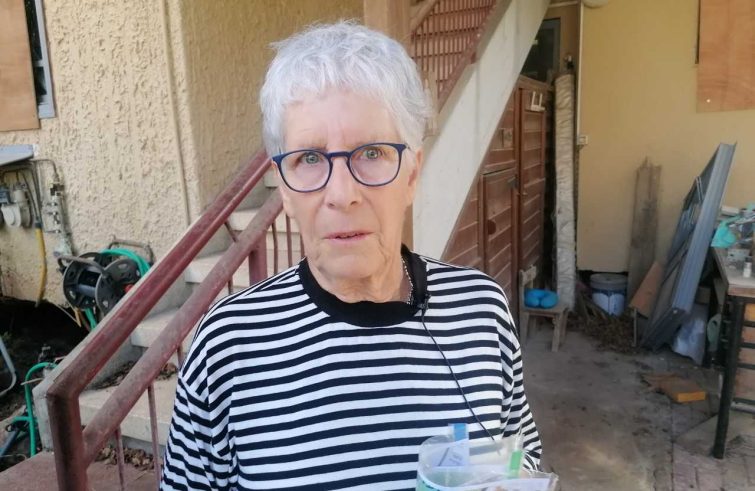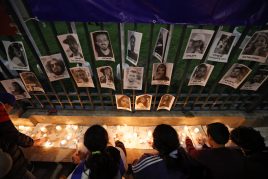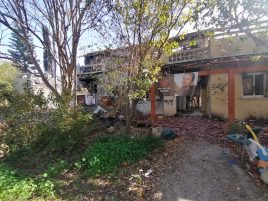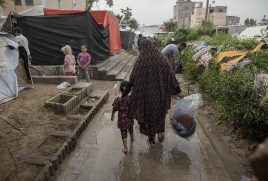
Just as it was for “Japanese, American, German and British women after the Second World War.” “The educational environment of Japanese women was to be raised as kamikazes. That is no longer the case. I have a friend in Germany who sent her daughter to a high school in England. Would that have been possible 70 years ago? That you could send a German girl to England?”
“There have been two world wars, but time has gone by since then. People have come to their senses. Japan and America are allies now.”
 She looks ahead, directing her gaze beyond 7 October 2023, the day when the Hamas terrorist attack on Israel claimed the lives of more than 1,200 Israeli civilians, with 253 people taken hostage, 134 of whom are still being held in Gaza. This is the testimony of Nili Bar Sinai, a 73-year-old Israeli who survived the attack on Kibbutz Be’eri, the scene of one of the most heinous massacres perpetrated by Hamas that day. “There is hope for the future on the condition that Hamas is defeated – she told SIR -, on the condition that women educate their children differently, if they raise them in a spirit of coexistence and not one of hatred. There has to be a change of policy, otherwise there will be no hope for the future.” However, she points out:
She looks ahead, directing her gaze beyond 7 October 2023, the day when the Hamas terrorist attack on Israel claimed the lives of more than 1,200 Israeli civilians, with 253 people taken hostage, 134 of whom are still being held in Gaza. This is the testimony of Nili Bar Sinai, a 73-year-old Israeli who survived the attack on Kibbutz Be’eri, the scene of one of the most heinous massacres perpetrated by Hamas that day. “There is hope for the future on the condition that Hamas is defeated – she told SIR -, on the condition that women educate their children differently, if they raise them in a spirit of coexistence and not one of hatred. There has to be a change of policy, otherwise there will be no hope for the future.” However, she points out:
“It all depends on the women, on the mothers, on how they will raise their children, on how they will educate them: whether they will teach them to kill or to live together.”
The presence of Hamas is like a rock weighing down on Gaza. Nili notes that “with all the money it has received and continues to receive from its supporters, Hamas could have given Gazans the best education, a better life, instead of building underground tunnels and teaching children how to kill. That is a doomed destiny. I am sure that Palestinian mothers, like all mothers, want their children to go to school, to university, to help humanity grow and evolve.”
 Remembering Vivian. In the week marking International Women’s Day, Nili remembers her dear friend Vivian, who was killed on 7 October. She is remembered as an example of coexistence. “Together with other people from the kibbutz, Vivian would transfer the sick Palestinians from Gaza to Israeli hospitals for treatment; she would ‘escort’ Palestinians from the West Bank and Gaza to prevent settlers from harming them. She worked to promote Arab-Israeli cooperation around the world. She also organised a conference with young Israelis and Palestinians, but she had to do it in Greece or Cyprus, I don’t remember exactly where, because it was not possible in Israel or Gaza. Before Hamas took over, we used to go to Gaza to carry out various activities together. Women should resist. There should be a civil movement in Gaza too.” For Nili, the future of both peoples lies with women, because, she insists,
Remembering Vivian. In the week marking International Women’s Day, Nili remembers her dear friend Vivian, who was killed on 7 October. She is remembered as an example of coexistence. “Together with other people from the kibbutz, Vivian would transfer the sick Palestinians from Gaza to Israeli hospitals for treatment; she would ‘escort’ Palestinians from the West Bank and Gaza to prevent settlers from harming them. She worked to promote Arab-Israeli cooperation around the world. She also organised a conference with young Israelis and Palestinians, but she had to do it in Greece or Cyprus, I don’t remember exactly where, because it was not possible in Israel or Gaza. Before Hamas took over, we used to go to Gaza to carry out various activities together. Women should resist. There should be a civil movement in Gaza too.” For Nili, the future of both peoples lies with women, because, she insists,
“Women are the ones who bring up their children, who teach them to live and not to kill, to live together and not to hate. Israeli and Palestinian women are capable of this. I have no doubts.”
 “I am sure because I believe that every mother wants a better future for her child. And the only way to have a better future is to learn to accept reality and to make the necessary changes. You just have to adapt to reality. And the reality is this: We are here and they are here and we have to share what we have. If they understand that, then so do we.” She concluded: “Women all over the world can help us in this endeavour. That is why education is a means to stop the war, to build a better future” and to “start thinking like Japanese, American, German and British women did after the Second World War.”
“I am sure because I believe that every mother wants a better future for her child. And the only way to have a better future is to learn to accept reality and to make the necessary changes. You just have to adapt to reality. And the reality is this: We are here and they are here and we have to share what we have. If they understand that, then so do we.” She concluded: “Women all over the world can help us in this endeavour. That is why education is a means to stop the war, to build a better future” and to “start thinking like Japanese, American, German and British women did after the Second World War.”











